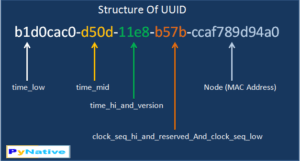

Generate GUID using Math.Random () To generate GUID using Math.Random () in Javascript, you can use the below code.
Uuid generator node how to#
See how to compile TypeScript with npm for more information if you want to use the uuid npm package with TypeScript. GUID (Globally Unique Identifier) or (UUID) Universally Unique Identifier is a 16 byte binary value and are identifiers designed to provide certain uniqueness guarantees. Recently usage of NanoID has drastically increased compared to UUID. John Jardin (Integration and Cloud Architect at Agilit-e) License.

A Node-RED node for simple, fast generation of RFC4122 UUIDS Based on the uuid NPM Module Author.

Node-RED UUID (Sponsored by Agilit-e) Created by Agilit-e. This means you are guaranteed to get a completely unique ID, unless you generate it from the same computer, and at the exact same time. Nanoid is a tiny, secure, URL-friendly, unique JavaScript library for generating unique IDs. A Node-RED Node for simple, fast generation of RFC4122. In addition to this, it also introduces another random component just to be sure of its uniqueness.
Uuid generator node install#
If you are using TypeScript you can also run the command npm install to install the type definitions for the uuid npm package. UUID v1 is generated by using a combination the host computers MAC address and the current date and time. Creating a package.json file is not needed, if you are adding uuid to an existing project.Īfter creating the package.json file run the command npm install uuid -save, and the uuid npm package will be added to the node_modules folder inside the project folder. crypto generate uuid node generate custom id node. This will create a package.json file, which will be used to install the uuid package. Then run the command npm init in a test project folder terminal window, and follow the prompts that are shown. We can create a sample node.js script to test out the functionality of the uuid npm package, but first make sure that Node.js and npm are installed. Note: The default node id (the last 12 digits in the UUID) is generated once, randomly, on process startup, and then remains unchanged for the duration of the. Besides generating a unique id, the uuid npm package has other utility methods available in its API that can be useful when working with unique identifiers, to ensure that they are valid. It supports commonJS modules and also ECMAScript Modules, making it a good cross-platform choice. It can generate version 1, 3, 4 and 5 UUIDs. The uuid npm package has zero dependencies, and over thirty thousand packages depend on it, making it a safe choice when an id is needed that is guaranteed to be unique. The JavaScript library we recommend for generating UUIDs in TypeScript is called (unsurprisingly), uuid. The uuid, or universally unique identifier, npm package is a secure way to generate cryptographically strong unique identifiers with Node.js that doesn't require a large amount of code.


 0 kommentar(er)
0 kommentar(er)
